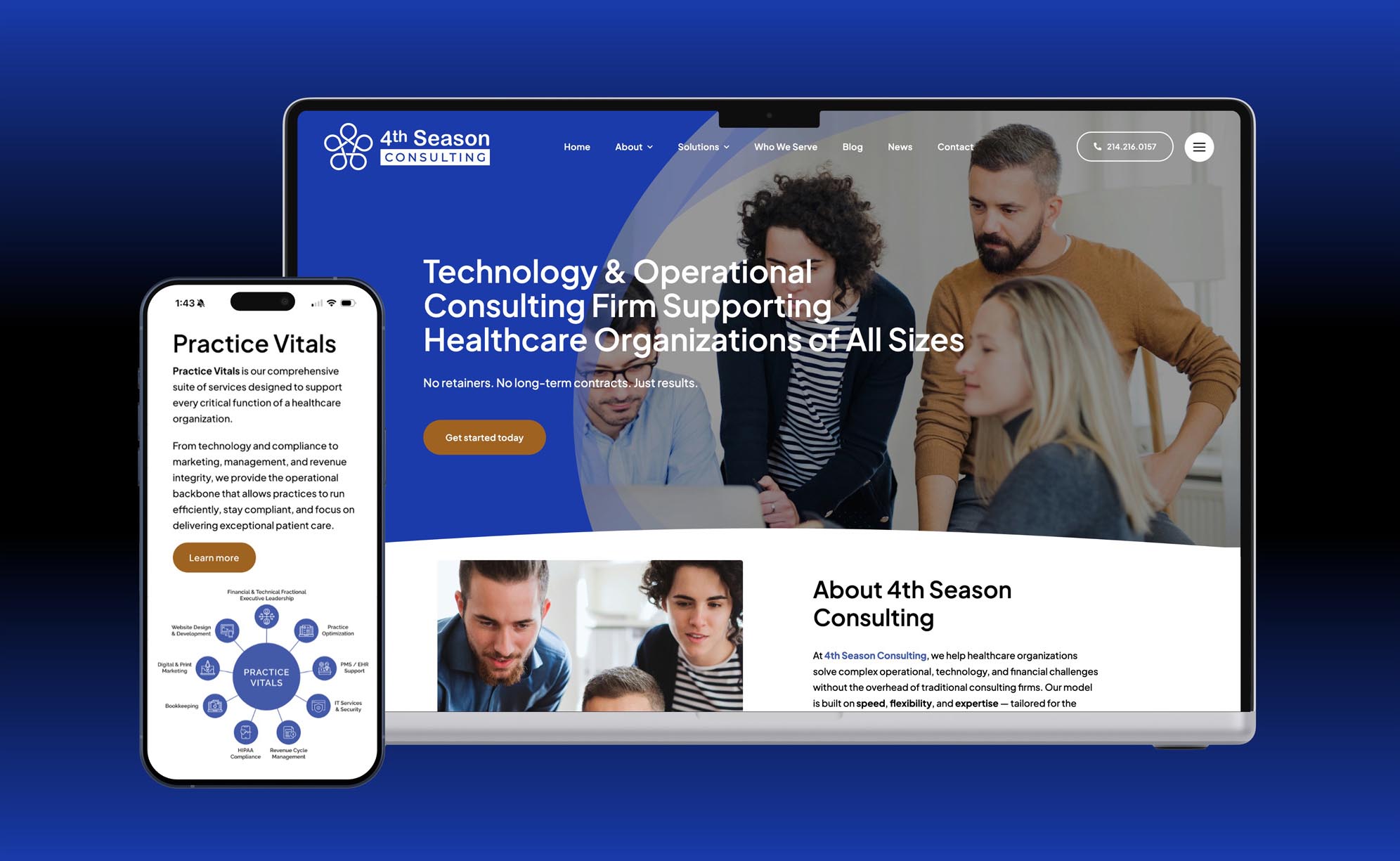
This is the second installment in our four-part series exploring the use of technology consultants.
How Healthcare IT Consultants Drive Innovation, Efficiency, and Future-Readiness
“Engaging technology consultants provides businesses with specialized expertise, strategic insights, and scalable solutions that drive innovation and operational efficiency.”— Forbes Technology Council, 2024
Introduction: The Growing Importance of Managed IT Services
In today’s rapidly evolving healthcare environment, technology is the backbone of patient care, compliance, and organizational growth. Yet, as digital transformation accelerates, many healthcare organizations struggle to keep pace with the latest advancements, regulatory requirements, and cybersecurity threats. The result is a widening talent gap that can hinder innovation and expose providers to risk.
Managed IT services has emerged as a strategic solution. By partnering with experienced IT consultants, healthcare executives and IT leaders can address complex challenges, gain access to specialized knowledge, and implement solutions that drive sustainable success. This article explores the multifaceted value of healthcare IT consulting, offers real-world insights, and provides actionable recommendations to help organizations make informed decisions.
The Talent Gap in Healthcare IT
Healthcare’s reliance on advanced IT systems, from electronic health records (EHRs) and telehealth platforms to analytics and cybersecurity, has intensified the need for skilled technology professionals. However, the supply of qualified healthcare IT talent lags behind demand, driven by factors such as rapid technological change, heightened security expectations, and competition from other industries.
This shortage can result in project delays, increased costs, and missed opportunities for innovation. Managed IT services firms fill this gap by providing immediate access to experts with up-to-date technical skills and deep industry experience. Instead of waiting months to recruit and onboard full-time staff, organizations can scale their teams quickly with consultants who are ready to deliver results from day one.
- Example: A large hospital network facing critical EHR upgrade deadlines engaged a managed IT services team to supplement its internal staff. The consultants brought specialized knowledge in system integration and workflow optimization, enabling a smooth transition without disruption to patient care.
Strategic Benefits of Managed IT Services
Engaging healthcare IT consultants offers a range of strategic advantages that extend beyond simply filling talent gaps. Here’s how consultants add value:
- Operational Efficiency: Consultants analyze existing workflows and recommend process improvements, reducing inefficiencies and enhancing productivity. Their objective perspective helps identify bottlenecks that internal teams may overlook.
- Innovation Enablement: With exposure to the latest tools, methodologies, and best practices, consultants introduce innovative solutions such as AI-driven analytics, cloud migration, and telemedicine platforms.
- Scalability and Flexibility: Consulting engagements are highly adaptable. Whether the need is short-term project support or long-term strategic guidance, organizations can scale consulting resources up or down without the constraints of permanent hiring.
- Cost Optimization: Rather than investing in permanent staff for specialized skills that may only be required temporarily, healthcare providers can leverage consultants to control costs and maximize ROI.
- Regulatory Compliance: Healthcare IT consultants stay current with HIPAA, HITECH, and other regulations, helping organizations avoid compliance pitfalls and costly penalties.
Real-World Insight: A regional health system used managed IT services experts to implement a secure cloud infrastructure, improving data accessibility while ensuring compliance with evolving federal regulations.
Common Concerns & Misconceptions
Despite these benefits, some healthcare executives harbor reservations about engaging consultants. Common concerns include:
- Onboarding Time: Worries that consultants will require extensive training on internal processes before delivering value.
- Collaboration Issues: Fears that consultants may not integrate well with internal teams, leading to miscommunication or duplicated efforts.
- Value Delivery: Apprehension that consultants may overpromise and underdeliver, or that their recommendations may simply reiterate what internal staff already know.
- “Land and Expand” Tactics: Concerns about firms intentionally prolonging engagements or pushing unnecessary services.
- Loss of Control: Misconceptions that consultants will undermine internal leadership or disrupt established workflows.
- Myth-Buster: The most reputable managed IT services firms operate with transparency, prioritize knowledge transfer, and measure success by their clients’ outcomes and not by the length or size of the engagement.
Building Trust with Managed IT Services Partners
Trust is the foundation of any successful consulting engagement. Best practices for establishing effective partnerships include:
- Prioritize Cultural Fit: Choose consultants who align with your organization’s values and communication style. A strong cultural fit promotes collaboration and minimizes friction.
- Demand Transparency: Expect clear communication regarding project scope, timelines, deliverables, and costs. Open dialogue builds confidence and ensures accountability.
- Set Shared Goals: Collaboratively define success metrics and desired outcomes. When consultants and clients work toward common objectives, alignment and trust naturally follow.
- Encourage Knowledge Transfer: The best consultants empower internal teams by sharing expertise and building in-house capabilities, not by creating dependency.
- Respect for Internal Leadership: Top managed IT services professionals act as collaborators and advisors, supporting internal leaders.
Tip: Request client references and case studies from prospective partners to validate their track record and approach.
Essential Questions for Selecting a Managed IT Services Firm
Selecting the right consulting partner is critical to project success and long-term value. When evaluating providers, healthcare executives and IT leaders should ask:
- What is your approach to understanding our business needs? Look for firms that invest time in learning your organization’s pain points, workflows, and strategic goals before proposing solutions.
- How do you ensure transparency during engagements? Ask about communication protocols, reporting frequency, and how project status and risks are shared.
- Can you share examples of similar healthcare IT consulting projects? Request case studies that demonstrate relevant experience and measurable outcomes in comparable organizations.
- What measures do you take to collaborate with internal teams? Seek evidence of successful partnerships with in-house staff, including processes for knowledge transfer and change management.
- What is your philosophy on cost and value? Evaluate whether the firm’s pricing aligns with your budget, and clarify how they measure and report on value delivered.
- Will you be actively involved in executing the work you architect? Confirm that senior consultants will participate in both planning and implementation, not just hand off execution to junior staff.
- Do you offer flexible engagement terms without long-term commitments? Flexibility is important, ensuring you can scale services as needed without being locked into restrictive contracts.
- How do you handle regulatory compliance and data security? Healthcare IT requires specialized knowledge of privacy laws and security standards. Ask for details on the firm’s compliance protocols and past experience.
- What is your process for post-engagement support? Inquire about ongoing support, troubleshooting, and training after the primary engagement concludes.
Real-World Success Stories
Case Study: Rural Health System Achieves Telehealth Transformation
- A network of rural clinics struggled to launch telehealth services due to limited IT resources and connectivity challenges. By engaging a managed IT services firm, they developed a tailored telemedicine platform, trained clinical staff, and implemented secure data integration. Within six months, patient access improved by 40%, and provider satisfaction increased significantly.
Case Study: Urban Hospital Strengthens Cybersecurity
- After a neighboring hospital suffered a ransomware attack, an urban medical center brought in healthcare IT consultants to assess vulnerabilities and implement enhanced security protocols. The consultants provided staff training, deployed advanced threat detection tools, and developed an incident response plan. The hospital’s cyber risk profile improved dramatically, and it passed its next compliance audit with zero findings.
Industry Trends & Future Outlook
Healthcare IT consulting is evolving alongside industry trends and emerging technologies. Key developments shaping the sector include:
- Artificial Intelligence (AI) and Machine Learning: Consultants are helping organizations leverage AI for predictive analytics, patient engagement, and clinical decision support.
- Cloud Migration: The shift to cloud-based infrastructure continues, with consultants guiding secure migration, data governance, and cost optimization.
- Interoperability: As regulatory requirements push for seamless data exchange, consultants are leading integration projects to connect EHRs, labs, and external partners.
- Population Health Management: Healthcare IT consultants support value-based care initiatives by deploying analytics platforms that identify care gaps and improve outcomes.
- Cybersecurity: With cyber threats on the rise, consulting firms provide risk assessments, security architecture, and incident response planning tailored to healthcare’s unique needs.
- Regulatory Change: Ongoing updates to HIPAA, the 21st Century Cures Act, and state-level privacy laws require consultants with deep compliance expertise.
Future Outlook: As healthcare organizations continue to digitize operations and embrace virtual care, demand for managed IT services will only grow. The most successful organizations will be those that proactively invest in the right partnerships and stay agile amid change.
Actionable Recommendations for Healthcare Organizations
- Assess Internal Capabilities: Conduct a gap analysis to determine where consulting support can deliver the most value.
- Set Clear Objectives: Define what success looks like for your consulting engagement, including timelines, deliverables, and measurable outcomes.
- Choose Partners Wisely: Use the evaluation questions outlined above to select managed IT services firms with proven experience and a collaborative approach.
- Foster Collaboration: Integrate consultants with internal teams, encourage open communication, and prioritize knowledge transfer to build long-term capabilities.
- Monitor Progress: Establish regular check-ins, track milestones, and measure results against predefined KPIs to ensure accountability and value delivery.
- Plan for Sustainability: Leverage consulting engagements to upskill internal staff, document processes, and lay the groundwork for future innovation.
Conclusion
The strategic use of managed IT services is no longer optional, it is essential for healthcare organizations that want to bridge the talent gap, drive innovation, and secure their future in a dynamic industry. By choosing the right consulting partners, setting clear goals, and embracing best practices, healthcare executives and IT leaders can achieve impactful change and position their organizations for long-term success. Whether you are embarking on a digital transformation, strengthening your cybersecurity posture, or seeking to enhance patient outcomes, the right healthcare IT consultants can be your most valuable allies.
About the Author
Patrick Kelly is the President and CEO of 4th Season Consulting, a respected leader in managed IT services and healthcare IT consulting. With over 20 years of hands-on experience in value-based medicine, population health, and care management, Patrick has guided healthcare organizations of all sizes through complex technology transformations. His expertise spans EHR optimization, digital health strategy, and compliance, and he is recognized for his commitment to delivering measurable results and empowering healthcare teams.
About 4th Season Consulting
4th Season Consulting specializes in managed IT services for the and offers a comprehensive portfolio of services:
- Business Intelligence & Analytics: Custom dashboards and reporting to support data-driven decision-making.
- Custom Development: Tailored application development and integration services.
- IT Support & Cloud Infrastructure: Scalable solutions for secure, reliable operations.
- HIPAA & Compliance Consulting: Expertise in privacy, security, and regulatory requirements.
- Digital Marketing: Strategies to enhance patient engagement and grow healthcare practices.
The 4th Season Consulting team serves healthcare providers from solo practices to large systems, delivering flexible engagements without contract minimums or long-term obligations. Their client-centered approach ensures each solution is tailored to the organization’s unique needs and strategic vision.



